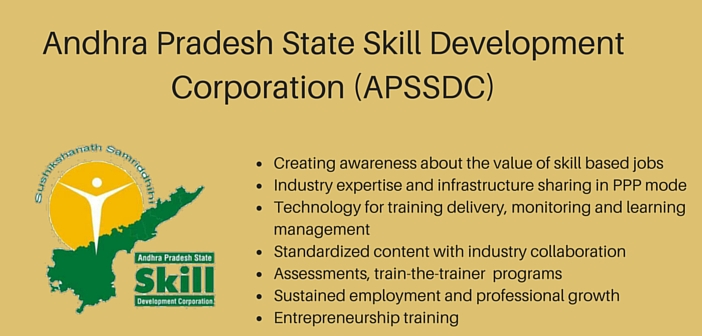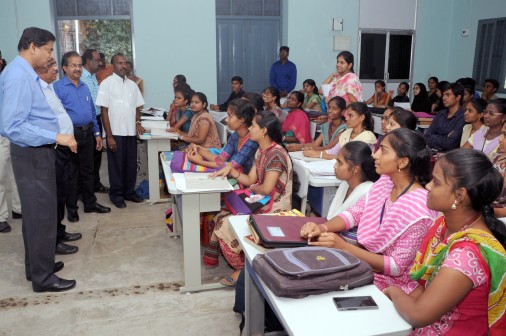With the constitution of state-level sector skills council, the Andhra Pradesh State Skill Development Corporation (APSSDC) is all set to roll out several training and placement programs in the PPP mode. While IT/ITES jobs constitute a major avenue for employment in the state, the efforts are consciously directed towards striking a balance with other sectors. In this Skill Story, Dr. Subbarao Ghanta, CEO, APSSDC, takes us through the opportunities and challenges in creating an ecosystem that ensures sustained and gainful employment through various basic skilling and upskilling initiatives from the Government of Andhra Pradesh.
Skill development and employability was one of the top items on our agenda. Soon after the bifurcation of the combined state of Andhra Pradesh, we are the first in the country to create a separate Department of Skill Development, Entrepreneurship and Innovation (DSDEI). APSSDC was formed to execute the vision of DSDEI. Our approach is to focus on the needs of the state by adapting the national framework in skill development. We decided to go ahead with 16 of the active 31 sector skills.
The national level framework gives inadequate importance and articulation to the state level needs. We have state level chapter, wherein local industry champions are identified, they will identify the skill gaps, enlist the certifying agencies, and facilitate train-the-trainer program.

Operating as a point of convergence
Our initiatives are directed at bringing in convergence between the center, the state and the district. We are aligned with central government schemes like DDU-GKY and NULM for both rural and urban livelihood. We also get district level training requests for skill upgradation from Janmabhoomi, our flagship welfare program. At the same time, we address the needs of the industry, such as textiles or construction, where they have huge requirement for trained workforce to meet their ambitious targets and business outcomes.
Andhra Pradesh has a bigger problem in attracting youth to skill based trades, because it is predominantly identified with the IT sector. Jobs in this sector have led to the mushrooming of engineering colleges, fuelling an aspiration for IT/ITES jobs.
Other professions like plumber, electricians, masons, or manufacturing jobs are never sought after, and these jobs are filled by migrants from other states. After bifurcation, with the reorganized state of AP, we don’t have much industry to talk about, and most of the IT industry has developed in Hyderabad. We are almost at the same level where we were 15 years ago. we have to bootstrap and rebuild everything. And our current efforts are in that direction.

Training targets and placement
To meet our targets, we are working with several placement agencies who are able to connect our trainees with the job market – local, national and international. While the training partners facilitate delivery of training, we also engage other departments like education and labour to supplement their efforts.
With the sudden impetus to skill development, the focus has mainly been on numbers. To meet the demand, we have to partner with the private sector. This brings in its own challenges. The general perception is that quantity affects quality. We have a credible mechanism to ensure quality and avoid dilution of standards. We work with certified training providers, with certified trainers as per the guidelines of DDU-GKY and NULM. We also verify about the infrastructure, mobilization aspects and respective sector skill council alignment.
The PPP model and MoUs
At the strategic level, the PPP model helps us in overcoming our capacity to achieve the training goals and targets. Earlier , the needs of skilled workforce were fulfilled in limited capacities by the government. But this has reached a saturation point. Now that we want to scale up, we work closely with private players sharing their expertise and infrastructure. However, we cannot leave it to them alone, hence the partnerships. This is getting realized through several MoUs in different sector skills.
For example, we are partering with Siemens to innovative initiatives in training of engineering graduates, with UNDP/IKEA Foundation’s help we are developing handicrafts cluster in Narsapur. We have also established 28 Youth Training Centres (YTCs) in different tribal belts of AP for skill training of tribal youth. We are working with Tata Sons, where they would run a full-fledged skill training with different courses from the Tata Group.
Jawahar Knowledge Centers (JKCs)
Way back in 2001- 2002, we set up Jawahar Knowledge Centers to train students for meeting the industry requirements. This was limited to the IT industry, since many IT companies has approached us to help with with trained manpower and address issues like attrition. We were able to rapidly increase the numbers. That’s how we trained 40000-45000 people in the combined state of AP.
The JKCs got diluted over a period of time in Engineering colleges because of some issues however, in degree colleges they are training 20000-25000 every year.
The potential for employment is greater in degree colleges. In the last few weeks we were able to train over 4000 students in degree colleges. We expect at least half of them to get into IT companies. And another 1500 will be placed in accounting related jobs. So that means the potential is there, the market is ready, we just have to impart the right skills.
Role of technology in implementing skill development initiatives
For example, we have internet connectivity, and we are talking about full fibre based network and already three districts- Srikakulam, Vizianagaram, and Visakhapatnam and other districts are also going to be over the Net. We are also using Aadhar, there are all kinds of unhealthy practices in this space, For learning management, some most advanced platform like Edex and MOOCs to host our content and carry out the assessments, particularly in engineering colleges
Engineering colleges and polytechnics
The popularity of engineering streams has created a lopsided situation. Normally, for an engineer, we have 4 technicians. It’s other way round here if you see the number of engineers versus the number of polytechnic graduates – it’s 4:1 ratio. Earlier polytechnic diplomas and degrees were considered as direct entry into a job. Today, this is becoming another route to get into engineering even though the graduates remain jobless. We have to counsel these students and give practical skills. At present, 42 skill development centers in polytechnics are giving us decent results. ITIs still have to go a long way, we have to strengthen them and tackle the lopsidedness if Make in India campaign has to be successful.
To catch them young, we are also implementing pilot vocational training in schools. This could well be the first step towards meeting the skill related challenges of a globalized market place.





